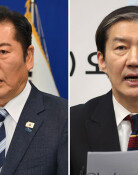[Editorial] Government Squeezing More Taxes from the Middle Class
[Editorial] Government Squeezing More Taxes from the Middle Class
Posted August. 26, 2005 03:06,
Park Byeong-won, vice-minister of the Ministry of Finance and Economy, said the day before yesterday that this years tax revenue deficit is serious enough so that it is hard to implement policies to expand fiscal spending. Tax revenue this year is expected to fall short of the targeted amount by four to five trillion won.
There are many reasons for this. Even when the government imposes a proper amount of taxes, there can be tax evaders. The government may not consider the peoples ability to pay taxes and impose taxes that are too high. Even when the government fails to find out the tax source of high income brackets including professional job holders, it is targeting tax payers who are easy to attack, such as companies and wage earners, increasing the incidence of bankruptcy and the number of people who give up paying taxes. With the economy in bad shape, the peoples ability to pay taxes is getting worse. Against this backdrop, the government is increasing taxes unreasonably, saying that there are too many things on which to spend money.
The government insists that In order to revive the economy, fiscal spending needs to increase. However, it is the misguided argument. In order to boost the economy, it is more effective for the government to decrease tax by ten trillion won and allow more money to flow in private sectors rather than to increase taxes by 10 trillion won and spending it all. To the extent that the expression taxes are leaking sounds right, national money management is being done poorly in many cases.
The governments bid to squeeze taxes seems to go beyond the proper level. The tax burden is unbearably serious, especially among middle-income brackets including wage earners whose tax sources are as transparent as a glass window. The tax burden per person last year stood at a record high of 3.16 million won. Lee Kye-ahn, a representative of the Uri Party said, Over the past five years, the excess collection amount of a variety of payroll taxes was 6.8 trillion won. Excessive taxes are being collected from workers who are easy to impose taxes on. Last year, a payroll tax of 9.8186 trillion won was collected, which is 1.5619 trillion won more than the budget.
Against this backdrop, the government is dramatically increasing property-related taxes for middle-income brackets that own only one house in the name of reining in real estate speculation. If the government fails to vitalize the economy and increases the tax burden on the people, there may be a tendency to resist paying taxes. The resentment caused by excessive tax burden is already running high. Instead of blaming the people for the deficiency of tax revenue, any responsible government would seek ways to decrease the tax burden.



![[단독]이혜훈 “장남 다자녀로 연대 입학”…당시 그런 전형 없었다](https://dimg.donga.com/c/138/175/90/1/wps/NEWS/IMAGE/2026/01/23/133215083.1.jpg)
![하버드 의사가 실천하는 ‘뇌 노화 늦추는 6가지 습관’ [노화설계]](https://dimg.donga.com/c/138/175/90/1/wps/NEWS/IMAGE/2026/01/22/133210626.3.jpg)

![[단독]“5000만원씩 두 상자…윤영호 ‘王자 노리개 상자’ 권성동에 건네”](https://dimg.donga.com/c/138/175/90/1/wps/NEWS/IMAGE/2026/01/23/133215085.1.jpg)
